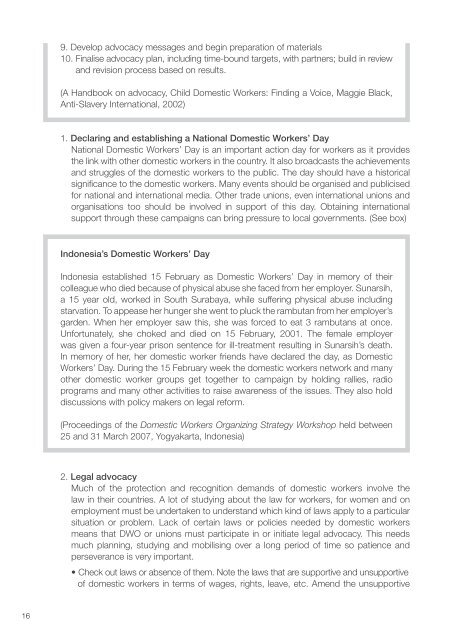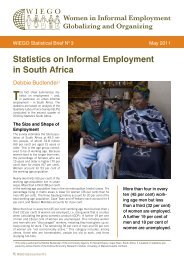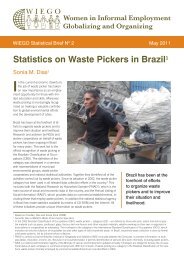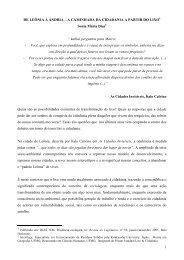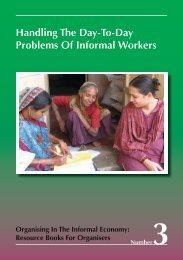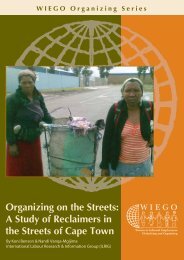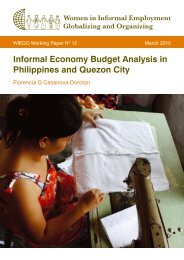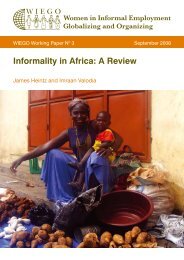Manual for Domestic Workers: Organizing a Better - Inclusive Cities
Manual for Domestic Workers: Organizing a Better - Inclusive Cities
Manual for Domestic Workers: Organizing a Better - Inclusive Cities
You also want an ePaper? Increase the reach of your titles
YUMPU automatically turns print PDFs into web optimized ePapers that Google loves.
9. Develop advocacy messages and begin preparation of materials<br />
10. Finalise advocacy plan, including time-bound targets, with partners; build in review<br />
and revision process based on results.<br />
(A Handbook on advocacy, Child <strong>Domestic</strong> <strong>Workers</strong>: Finding a Voice, Maggie Black,<br />
Anti-Slavery International, 2002)<br />
1. Declaring and establishing a National <strong>Domestic</strong> <strong>Workers</strong>’ Day<br />
National <strong>Domestic</strong> <strong>Workers</strong>’ Day is an important action day <strong>for</strong> workers as it provides<br />
the link with other domestic workers in the country. It also broadcasts the achievements<br />
and struggles of the domestic workers to the public. The day should have a historical<br />
significance to the domestic workers. Many events should be organised and publicised<br />
<strong>for</strong> national and international media. Other trade unions, even international unions and<br />
organisations too should be involved in support of this day. Obtaining international<br />
support through these campaigns can bring pressure to local governments. (See box)<br />
Indonesia’s <strong>Domestic</strong> <strong>Workers</strong>’ Day<br />
Indonesia established 15 February as <strong>Domestic</strong> <strong>Workers</strong>’ Day in memory of their<br />
colleague who died because of physical abuse she faced from her employer. Sunarsih,<br />
a 15 year old, worked in South Surabaya, while suffering physical abuse including<br />
starvation. To appease her hunger she went to pluck the rambutan from her employer’s<br />
garden. When her employer saw this, she was <strong>for</strong>ced to eat 3 rambutans at once.<br />
Un<strong>for</strong>tunately, she choked and died on 15 February, 2001. The female employer<br />
was given a four-year prison sentence <strong>for</strong> ill-treatment resulting in Sunarsih’s death.<br />
In memory of her, her domestic worker friends have declared the day, as <strong>Domestic</strong><br />
<strong>Workers</strong>’ Day. During the 15 February week the domestic workers network and many<br />
other domestic worker groups get together to campaign by holding rallies, radio<br />
programs and many other activities to raise awareness of the issues. They also hold<br />
discussions with policy makers on legal re<strong>for</strong>m.<br />
(Proceedings of the <strong>Domestic</strong> <strong>Workers</strong> <strong>Organizing</strong> Strategy Workshop held between<br />
25 and 31 March 2007, Yogyakarta, Indonesia)<br />
2. Legal advocacy<br />
Much of the protection and recognition demands of domestic workers involve the<br />
law in their countries. A lot of studying about the law <strong>for</strong> workers, <strong>for</strong> women and on<br />
employment must be undertaken to understand which kind of laws apply to a particular<br />
situation or problem. Lack of certain laws or policies needed by domestic workers<br />
means that DWO or unions must participate in or initiate legal advocacy. This needs<br />
much planning, studying and mobilising over a long period of time so patience and<br />
perseverance is very important.<br />
• Check out laws or absence of them. Note the laws that are supportive and unsupportive<br />
of domestic workers in terms of wages, rights, leave, etc. Amend the unsupportive<br />
16


